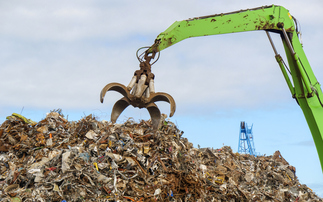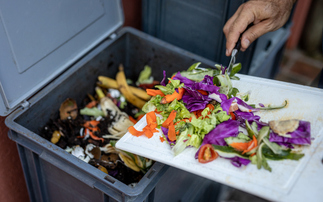The blitz of measures to tackle plastic waste is hugely welcome, but there is no point pretending they don't come with significant risks attached
Nobody wants to be the first to say it, but it still needs saying. The government's war on plastic is hugely welcome, immensely exciting, and potentially disastrous.
Everyone who knows anything about waste, recycling, and product lifecycles, including many within government, understands the risks. They are fully aware that any effort to tackle the scourge of marine plastic pollution and enhance material resource efficiency across the economy is both supremely complex and risks being littered with almost as many unintended consequences as you find discarded bottles on a beachfront. And yet it is in no one's immediate interest to publicly wrestle with this inconvenient reality.
The government is said to be delighted with how its environmental revamp has landed. Retailers and other brands are pleased their various plastic pledges have taken some of the heat out of the post-Blue Planet criticism. Green campaigners are loath to complicate one of their biggest and most unequivocal victories in years. And plastics manufacturers know any attempt to highlight how blanket bans or new taxes could prove counterproductive understand full well their protestations would fail to pass the Mandy Rice Davies test: well, they would say that wouldn't they.
And yet no aspect of this entirely understandable omerta makes the difficulties faced by the war on plastic waste any less daunting.
You could write a book on the complexities contained in the government's seemingly simple target to end all avoidable plastic waste, and I don't doubt some enterprising type is already working on such an opus. But here are just a few of the potential pitfalls.
Take the announcement last week that ministers want to ban plastic straws and plastic stirrers. Theresa May said the government had opted to start with these particular products because they pose a particular threat to marine life and alternatives are available. This is true, but it is also worth considering what those alternatives are. Of course, the best alternative for a plastic stirrer is a teaspoon and the best alternative to a plastic straw in all circumstances - bar when they are medically recommended - is no straw at all. But we all know that is not how this ban would play out.
Companies would switch to paper straws and wooden stirrers. That means more demand for timber and you don't need a PhD in sustainable land management to know that means significant environmental implications. Would biomass-based alternatives to plastic straws and stirrers have a lower environmental footprint than the rightly vilified plastic incumbents? It depends. The biomass versions would pose a negligible threat to marine habitats, but their carbon footprint would very much depend on a complex web of variables.
As with the debate around biofuels, much would depend on the full lifecycle of the supposedly greener alternatives. With raw materials sourced from sustainably managed forests and appropriate recycling in place you could probably deliver carbon savings. But straws and stirrers sourced from who knows where and chucked in to landfill would lead to higher carbon emissions through both land use impacts and decomposition. It is also worth noting these are commoditised, price sensitive, low margin, mass produced products. Is your local café going to ensure its stirrers and straws are a 100 per cent FSC certified? Some will, others most definitely won't.
Or take Iceland's admirably ambitious pledge to end all plastic packaging in its own brand products. Privately some of Iceland's competitors are - to put it mildly - furious at the recklessness of this proposal.
There is no doubt levels of plastic packaging can be drastically reduced across the supermarket sector. We've all seen the abominable shrink-wrapped cabbages and apples. Equally, it is essential the industry streamlines the different types of packaging it uses and makes it much easier for the material it disseminates across every corner of the country to be recycled.
But ditching plastic packaging altogether when exciting innovations in genuinely biodegradable plastics are yet to be fully realised, runs the risk that biomass-based packaging will become the default alternative. At this point you run into the precisely same questions about lifecycle impacts that the proposed blanket ban on stirrers and straws faces, just on a much bigger scale. If every supermarket switched to paper- and card-based packaging you have serious land use implications. Even if retailers, under pressure from customers, opt for FSC certified materials, there is still a knock-on impact on the wider market. Would emissions rise? Again it depends on countless variables, but we can be sure that the risk of an unintended uptick in emissions is obvious.
Finally, take the growing interest in bioplastics the war on plastics has sparked. There are some fascinating innovations going on in this space and encouraging news of materials in development that could prove to be genuinely sustainable: plastics that are made from algae at the start of their life, or eaten by algae at the end of their life. Plastics that fully biodegrade or can be recycled indefinitely, drastically minimising the risk of marine pollution.
But bioplastic is a potentially confusing umbrella term. There are bioplastics that may be made from biomass, but are essentially the same as conventional plastics, meaning their adoption does nothing to tackle marine pollution. There are supposedly biodegradable plastics that do not fully biodegrade. And, of course, there are big unanswered questions about where the feedstocks come from. A 2014 study comparing the carbon footprint of plastic and bioplastic straw products was fairly typical of the genre, concluding the bioplastic version had the higher carbon footprint, but under certain circumstances the bioplastic version could deliver the lower footprint.
The simple reality is that if in cracking down on plastics you increase demand for biomass, be it timber for card or paper or corn, sugar cane, or other feedstocks for bioplastics, then there are inevitable land use implications, with associated implications for greenhouse gas emissions, food security, and biodiversity. If it is environmentally and morally questionable to produce fuel from land that could be used to grow food, then does not the same question apply if you use that land to produce packaging?
Make no mistake, none of this is to suggest policymakers and businesses should now shy away from the war on plastic waste, or take their foot off the pedal and kick necessary action into the long grass of interminable reviews and consultations. The scale of plastic pollution in the world's oceans and the havoc it wreaks is unconscionable, the threats to biodiversity, food security, and human health are all too real, the carbon footprint of the global plastics industry is incompatible with the deep decarbonisation that is required this century. Something has to be done. It would be an immense missed opportunity were this current period of public and political interest not fully harnessed.
However, at the same time businesses and policymakers need to be fully cognisant that across every part of the packaging lifecycle environmental trade-offs and complications will arise. Our understanding of precisely how this necessary crack down on plastic waste will pan out is sketchy at best and any new measure needs to properly engage with the all too obvious risk of unintended consequences.
A handy rule of thumb is that this is a scenario where the classic waste hierarchy needs to be applied as fully as possible. Companies need to reduce first, re-use second, and recycle third. That is why moves such as Boston Tea Party's bold pledge to stop using disposable coffee cups altogether is so important - there needs to be a concerted effort to actually end the use of unnecessary products. That is why fiscal policy needs to be much more cleverly targeted to genuinely drive product re-use - the neglect of the re-manufacturing sector remains scandalous. And that is why proper, national reform of our overly-complex and diffuse recycling regimes is far more important that symbolic bans on coffee stirrers - it is critical Michael Gove faces down any opposition from councils and delivers a proper national waste strategy once and for all.
Consequently, the launch of yesterday's Plastic Pact and the willingness of a raft of corporate giants and recycling specialists to work together to tackle this challenge is hugely welcome.
It is not unreasonable to point out that many of these companies are the precise same firms that for years have failed to get a handle on the packaging problem and have watched on as UK recycling rates have stalled. But equally, there is no chance of winning the war on plastic unless manufacturers, retailers, recyclers, and policy makers all work together to deliver a co-ordinated and comprehensive approach.
The real question now is whether these businesses are willing to make the tough evidence-based decisions required to truly crack down on plastic waste. Are they willing to genuinely reduce levels of packaging and other disposable items, occasionally asking their customers to lose a little convenience at the same time? Are they willing to accept that price signals may have to play a role in this transition? Are they willing to deploy measures that could pose a threat to future sales? Are they willing to give over some valuable space on the shop floor for recycling infrastructure? Are they willing to invest properly in R&D? Are they willing to avoid alternative materials that bring with them their own environmental problems?
Most of all, are they willing to fully countenance a fundamental shift in our economic and resource models? One of the reasons the UK produces more plastic waste than comparable European economies is that we have fully embraced an on-the-go lunch culture that is anathema to our European neighbours. Are we willing to change the way we eat and drink in order to tackle plastic waste?
When businesses and policymakers start publicly discussing these questions we'll get a much better idea as to whether the war on plastic is winnable.









